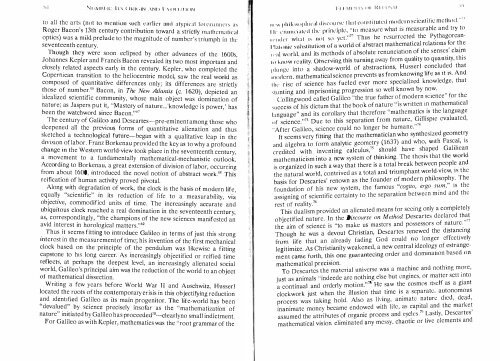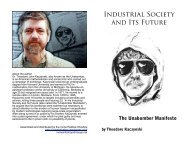CONTENTS - ouroboros ponderosa
CONTENTS - ouroboros ponderosa
CONTENTS - ouroboros ponderosa
You also want an ePaper? Increase the reach of your titles
YUMPU automatically turns print PDFs into web optimized ePapers that Google loves.
,f\,,! I II\·IIU' h: : ITS (hW dN .-\NI ) 1 - \ I II II, II IN<br />
10 all the arts (not to menlion slich earlier and atypical Ii.H"l'rllllllt'l"S ;IS<br />
Roger Bacon's 13th century contribution toward a strictly matilcmatic,li<br />
optics) was a mild prelude to the magnitude of number's triumph in the<br />
seventeenth century.<br />
Though thcy wcre soon eclipsed by other advances of the 1600s,<br />
Johannes Kepler and Francis Bacon revealed its two most important and<br />
closely related aspcts early in the century. Kepler, who completed the<br />
Copermcan tranSitIon to the heliocentric model, saw the real world as<br />
composed of quantitative differences only; its differences are strictly<br />
thos of number." Bacon, in The Ne w Atlantis (c. 1620), depicted an<br />
Ideahzed sCientific commumty, whose main object was domination of<br />
nature; as Jaspers put it, "Mastery of nature .. . 'knowledge is power ' has<br />
been the watchword since Bacon.""<br />
The century of Galilco and Descartes-pre-eminent among those who<br />
deepened all the previous forms of quantitative alienation and thus<br />
sketched a technological future-began with a qualitative leap in the<br />
diVISIOn of labor. Franz Borkenau provided the key as to why a profound<br />
change m the Western world-view took place in the seventeenth century,<br />
a movement to a fundamentally mathematical-mechanistic outlook.<br />
According to Borkenau, a great extension of division of labor, occurring<br />
from about 1600, mtroduced the novel notion of abstract work." This<br />
reification of human activity proved pivotal.<br />
Along with degradation of work, the clock is the basis of modern life<br />
eq ally "scientific" in its reduction of life to a measurability, vi<br />
obJective, commodified units of time. The increasingly accurate and<br />
ubiqUItous clock reached a real domination in the seventeenth century<br />
as, correspondingly, "the champions of the new sciences manifested ad<br />
avid interest in horological matters.""<br />
. Thus it seems fitting to introduce Galileo in terms of just this strong<br />
mtcrest m the measurement of time; his invention of the first mechanical<br />
clock based on the principle of the pendulum was likewise a fitting<br />
capstone to hiS long career. As increasingly Objectified or reified time<br />
reflects, at perhaps the deepest level, an increasingly alienated social<br />
world, Gahleo's principal aim was the reduction of the world to an object<br />
of mathematical dissection.<br />
Writing a few years before World War Jl and Auschwitz, Husser!<br />
located the . roots of the co temporary crisis in this objectitying reduction<br />
and IdentJhed Gahleo as Its main progenitor. The life-world has been<br />
"devalued" by science precisely insofar as the "mathematization of<br />
nature" initiated hy Galileo has proceeded7°--clearlyno small indictment.<br />
For Galileo as with Kepler, mathematics was the "root grammar of the<br />
'<br />
II\" W I Iii i It \S( )pl! ical d isCt HI I'St' I Ii:! t Ct )llS\ i t utcd Ill< )(ern scie n tine me tholl. ". .'1<br />
I It' ('Illilirialni tlH: principle, "tu measure what IS measurahle and try to<br />
"·,,dn what is "ot so yet. "" Thus he resurrected the Pythagorean<br />
I 'lal< ,lIie substitution of a world of ahstract mathematical relations or ,.he<br />
" .al worltl, and its methods of ahsolute renunciation of the senses claJ <br />
10 1l0W reality. Ohscrving this turning away from quality to quantity, thiS<br />
t,llInge into a shadow-world of abstractions, Husser! concluded that<br />
"I< "lcrn. math;;matical science prevents us from knowmg lit;; as It IS. And<br />
t Ill" rise of science has fueled ever more specialized knowledge, that<br />
stunting and imprisoning progression s well known hy now. ,, '<br />
Collingwood called Galileo "the true father 2t modern SCIence for the<br />
SlIeccss of his dictum that the book of nature IS wntten m mathematical<br />
language" and its corollary that thcrefore "mathematics is the language<br />
I· ·c·cnce ,,73 Due to this separation from nature, GJlhsple evaluated,<br />
I) S 1 . 74<br />
·'After Galileo, science could no longer be humane."<br />
[t seems very fitting that the mathematician who synthcSIZed geometry<br />
and algehra to form analytic geometry (1637) and who, With Pascal, IS<br />
credited with inventing calculus," should have shaped GalIllean<br />
mathematicism into a new system of thinking. The thesis that the world<br />
is organized in such a way that thcre is a total hreak between people an<br />
the natural world contrived as a total and tnumphant WOrld-VICW, IS the<br />
basis for Descarts' renown as the founder of modern philosophy. The<br />
foundation of his new system, the famous "cog ito, ergo sm," is the<br />
assigning of scientific certainty to the separation between mmd and the<br />
f I· 76<br />
rest 0 rea l!y.<br />
. .<br />
This dualism provided an alienated means tor seemg only a completely<br />
ohjectified nature. In the Discourse on Method Descartes dcclared t;<br />
the aim of sciencc is "to make us mastcrs and possessors of naturc :<br />
Though he was a devout Christian, Descartes renewed the dlstanemg<br />
from life that an already fading God could no longer cffcclively<br />
legitimize. As Christianity weakened, a new central ideology of estrange<br />
ment came forth, this one guarantecing order and dommalion based on<br />
mathcmatical precision.<br />
To Descartes the material universe was a machmc and noth,ng more,<br />
just as animals "indeede arc nothing else hut engines, or matter sell mto<br />
a continual and orderly motion."" He saw the cosmos Itsdf as a giant<br />
clockwork just when the illusion that time is a separate, autonomous<br />
process was taking hold. Also as li : ing, . animate nature dle, dea,<br />
inanimate money became endowed With hie, as capital and the marke<br />
assumed the attrihutes of organic process and c')'clcs -'" Lastly, Descartes<br />
mathematical vision eliminated any messy, chaotic or live clements and<br />
.<br />
.<br />
.<br />
>






